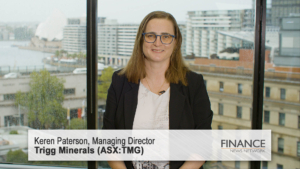
Trigg Minerals Limited (ASX:TMG) Managing Director Keren Paterson discusses the company's latest assay results and its new technology for producing sulphate of potash.
Tim McGowen: We're talking sulphate of potash today with Trigg Minerals (ASX:TMG). The company's an exploration and development company focused on brine-hosted fertiliser minerals that are critical for the production of high-nitrogen food sources. We have with us the Managing Director and CEO, Keren Paterson. Keren, thanks for your time.
Keren Paterson: Thank you for having me.
Tim McGowen: Now, firstly, you've just completed your 2022 drilling season. What were the key learnings of the recent drilling and assay results from Lake Throssell?
Keren Paterson: Well, we drilled a couple of holes that are much bigger diameter than the traditional exploration hole. So, with that, we're able to put down a borehole magnetic resonance geophysical tool, which simply gives us a photograph of everything going down the hole and into the hole as well. So, that's given us a lot of information around the porosity in the specific hill, which is really important because this is a water deposit. That's what we are looking for is the water with the minerals dissolved in it, so that we're looking for the pore spaces and any information on how rapidly we'd be able to pump from those potential production bores.
Tim McGowen: And, of course, much of the resource is also in adjoining tenements. They're unexplored. How are you looking to drill there?
Keren Paterson: So, it's open along strike. We already have a really substantial resource there with the scoping study supporting a 21-year mine life. So, it's just a matter of how much we really need to drill before we develop the project. But it is a big project. Trigg has 100 per cent ownership of all those tenements. They're all granted, with native title access agreements for all the exploration. And also, on the results, the brine assays are also really consistent with everything that we've received before. So, what we're seeing is a very low variability in the assay results. So, we're getting a lot of confidence around the quality and understanding of the chemistry as well as the ability to pump the deposit.
Tim McGowen: And, Keren, your second announcement recently on the ASX was in relation to new technology, with the announcement outlining a potential alternative process for producing SOP. How could this work to improve things like quality, costs, production, etc?
Keren Paterson: Well, one of the challenges with full evaporation of the product before it goes into the process plant is being open to the atmosphere. And the first part of the evaporation process is quite simple, getting the bulk of the water out, but the second part becomes really quite complex, and it's really driven by the chemistry. So, we've seen some opportunities there to improve on that by putting it into more of a controlled environment to do it. And we've done some test work that have come back with some really fabulous results. So, we think we've cracked it in how we can improve the reliability of the processing of sulphate of potash. And the way we've gone about it, by putting it into that controlled environment, has the potential to preserve some of that water that would otherwise be evaporated, and that will also help with the processing and ultimately the cost of the project.
Tim McGowen: And just on that, so what are some of the potential trade-offs in determining the kind of economic benefit of this potential new process?
Keren Paterson: By being able to speed it up, that's important as well. We can bring the payback forward. It gives us more reliability, so more consistency over getting the product. And also, consistency over the product then goes into the next stage of the processing, which is a sulphate of potash process plant to produce a product. So, it has a lot of benefits to the whole processing side of things, but also it's got a potential to harvest some of the water from the brine, because a traditional evaporation process puts all that water into the atmosphere, and then you need more process water from elsewhere to then put into the process plant. So, this becomes much more efficient in the process of producing a natural sulphate of potash product for food security.
Tim McGowen: You've just recently listed on the OTC exchange in the US. Is the strategy moving forward in terms of funding to find a cornerstone investor, offtake partners? What's the strategy look like?
Keren Paterson: Yeah, absolutely. We're looking at exploring all the potential ways to bring this to market. It is really important. Australia imports still the majority of the sulphate of potash that we consume. And this is a project of global scale, potentially top 10 producer of sulphate of potash. So, we are looking for a strategic partner to help us build it, and obviously the investment and the funds to do that.
Tim McGowen: And, of course, we just started 2023. What are some of the milestones you're looking to achieve over the next 12 months or so?
Keren Paterson: So, the most important thing is to take this process technology through to a pilot-scale process. So, from there, we can then determine the economic impacts of it and then can go through and either update the scoping study or advance through to the prefeasibility study with it.
Tim McGowen: Keren, thanks for your time. Nice to see you in Sydney.
Keren Paterson: Thank you, Tim.
Ends
Copyright 2023 – Finance News Network
Source: Finance News Network